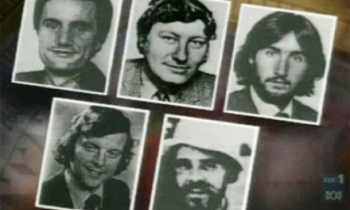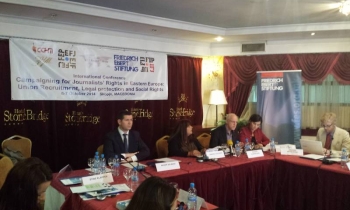Despite pronouncements that the situation in the Philippines has "normalised" enough to warrant a lifting of a "state of emergency" declared by President Gloria Macapagal Arroyo last month, media harassment "arrogantly continues" in the country, the Southeast Asian Press Alliance (SEAPA) has alleged.

Swift coverage and concerted pressure from journalists thwarted a move by the Philippines police to search the office of the Philippine Centre for Investigative Journalism (PCIJ). On March 13, a Quezon City judge apparently denied a request by the politically-connected sound engineer Jonathan Tiongco for a warrant to search PCIJ's office primises. PCIJ is a founding member of SEAPA.
Sources in the lower courts alerted PCIJ as to how, on the afternoon of March 13, three policemen, accompanied by Tiongco, asked Quezon City Judge Alan Balot to issue a warrant allowing the police to search the PCIJ office.
Tiongco is the same sound engineer presented by President Gloria Macapagal Arroyo's current chief of staff (then environment secretary), Michael Defensor, to the media in 2005. Tiongco's expert opinion was then used in an effort to discredit audio recordings that suggested Arroyo had cheated her way to the presidency. Defensor denied any knowledge of Tiongco's renewed petition for a search warrant against PCIJ. Tiongco's first attempt to obtain this search order on March 10 was denied by another city judge.
Alerted by PCIJ to the warrant request, journalists from various media organisations waited outside Balot's office while the hearing for the search warrant started late in the afternoon. PCIJ said it was not able to confirm whether Judge Balot granted the request, but some court sources said that the presence of journalists in front of his office at the very least has delayed his action.
PCIJ was unable to get a copy of the chargesheet, but its lawyers believe that the case is linked to the one filed by Tiongco against PCIJ in late 2005. In that case, filed before the Department of Justice, Tiongco said that PCIJ should be charged with inciting to sedition for publishing online the controversial "Hello, Garci" tapes that brought the Arroyo government to its worst crisis in 2005.

The tape allegedly contained wiretapped conversations between former election commissioner Virgilio Garcillano and several officials, possibly including Arroyo. The recordings galvanised public perception that Arroyo had cheated in the last presidential elections. Tiongco alleged that the posting of the audio recordings led the opposition to call for the president's resignation and impeachment, and that it encouraged civil society groups to hold rallies against the president. This was tantamount to inciting to sedition, he said.
In a ruling on October 11, 2005, the Supreme Court threw out Tiongco's petition demanding that the PCIJ remove the "Hello, Garci" recording from its website. The high tribunal asserted that the constitutional right to free expression was paramount. "Free expression is guaranteed by the Constitution," the Supreme Court said. "Any deviation from this rule through judicial restraint can only be after a proper trial of facts."
The Supreme Court also described Tiongco's first petition as "barely comprehensible" and "bereft of merit." It said that Tiongco should have sought professional legal advice before filing his motion.









